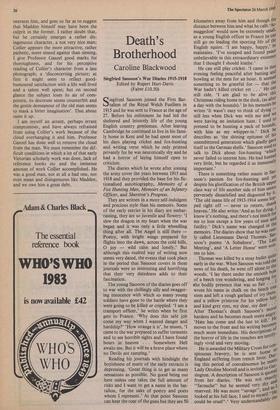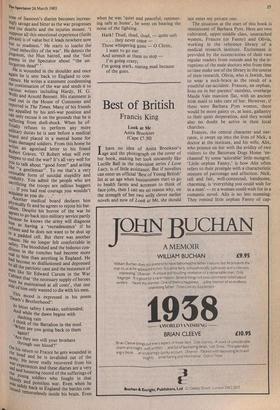Death's Brotherhood
Caroline Blackwood
Siegfried Sassoon's War Diaries 1915-1918 Edited by Rupert Hart-Davis (Faber 10.50) Q iegfried Sassoon joined the First Bat- talion of the Royal Welch Fusiliers in 1915 and he was sent to France at the age of 27. Before his enlistment he had led the sheltered and leisurely life of the young English country gentleman. After leaving Cambridge he continued to live in his fami- ly home in Kent and he had spent most of his days playing cricket and fox-hunting and writing verse which he only printed privately for he was neurotically shy and he had a horror of laying himself open to criticism.
The diaries which he wrote after joining the army cover the years between 1915 and 1918 and they provided the base for his fic- tionalised autobiography, Memoirs of a Fox Hunting Man, Memoirs of an Infantry Officer, and Sherston's Progress.
They are written in a more self-indulgent and precious style than his memoirs. Some of the early entries in his diary are embar- rassing, they are so juvenile and flowery: 'I slew the dragon in my heart when the war began and it was only a little wheedling thing after all. The Angel is still there — Poetry, with bright wings prepared for flights into the dawn, across the cold hills, 0 joy — wild calm and lonely.' But although this exalted way of writing now seems very dated, the events that took place in the period that Sassoon covers in these journals were so interesting and horrifying that their very datedness adds to their fascination.
The young Sassoon of the diaries goes off to war with the chillingly silly and swagger- ing innocence with which so many young soldiers have gone to the battle where they were going to be killed or crippled. 'I am a transport officer,' he writes when he first gets to France. 'Why does this safe job come my way when I wanted danger and hardship?' How strange it is', he muses, 'I came to the war prepared to suffer torments and to see horrible sights and I have found hours in heaven . . Somewhere Hell awaits me. But it will be a brave place where no Devils are ramping.'
Reading his journals with hindsight the boyishness of many of the early extracts is depressing. 'Great thing is to get as many sensations as possible. No good being out here unless one takes the full amount of risks and I want to get a name in the bat- talion, for the sake of poetry and poets whom I represent.' At that point Sassoon can hear the roar of the guns but they are 50
kilometers away from him and though the distance between him and what he calls 'Ar- maggedon' would now be extremely small, as a young English officer in France he can still go on leading the sporting life of the English squire. 'I am happy, happy,' Ile maintains. 'I've escaped and found peace unbelievable in this extraordinary existence that I thought I should loathe.' He can still play cricket. 'I came in that evening feeling peaceful after batting an bowling at the men for an hour. It scenic' something to be grateful for — that the War hadn't killed cricket yet . . .' He can still ride. 'I am glad to be alive this Christmas riding home in the dusk, (as after a day with the hounds).' In his memoirs he writes 'It wasn't easy to think of dying still less when Dick was with me and we were having an imitation hunt. I used to pretend to be hunting a pack of hounds, with him as my whipper-in.' Dick be describes as 'the shining epitome of his unembittered generation which gladly gave itself to the German shells.' Sassoon used to talk to Dick about fox-hunting `wilteAl/ never failed to interest him. He had WE,' very little, but he regarded it as immenselY important.' There is something rather manic in Sas' soon's passion for fox-hunting and Yet despite his glorification of the British uPller class way of life another side of him seeols perversely dissatisfied and disgusted bY it' 'The old inane life of 1913-1914 seems loP' ped right off — never to return, thal heaven.' He also writes 'And as for dying, know it's nothing, and there's not much fo,r me to lose except a few years of ease arlu futility.' Dick's name was changed in th_f memoirs. The diaries show that he was rear ly called Lieutenant David Thomas. Sas: soon's poems 'A Subaltern', 'The La.s1 Meeting', and 'A Letter Home' were writ- ten to him. Thomas was killed by a stray bullet quite early in the war. When Sassoon was told tile news of his death, he went off alone to th,e woods. 'I lay there under the smooth Wier of a beech tree wondering, and longing f°I the bodily presence that was so fair • • wrote his name in chalk on the beech We' stem and left a rough garland of ivy there; and a yellow primrose for his yellow hal, and kind grey eyes, my dear, my dear • • After Thomas's death Sassoon's in°° hardens and he becomes much more angrie' 'Hate has come and the lust to kill.' s moves to the front and his writing becoine, much more immediate. His descriptio°s. the horroroflifveeirntheotvrienngc.hes are tern iy vivid and y m ifY" He is awarded the Military Cross for wino.' spicuous bravery, he is sent home_ England suffering from trench fever.Ifil:s ing this period of convalescence he inee`.. Lady Ottoline Morrell and is invited toted Gar o sington. A description of Sassoon is clu 1, from her diaries. 'He was not exactud "farouche" but he seemed very shy arl I reserved. He was more "savage", and 1.1s looked at his full face, I said to mYself could be cruel".' Very understand'' the tone of Sassoon's diaries becomes increas- 410Y savage and bitter as the war progresses and the deaths and the injuries mount. I suppose all this emotional experience (futile Phrase) is of value but it leads nowhere now but to madness.' He starts to loathe the :cruel imbecility of the war'. He detests the Jingoism, the Hun hatred, and the 'fool Poems in the Spectator about "the un- forgotten dead" He is wounded in the shoulder and once again he is sent back to England to co. n- valesce. He writes a statement condemning i the continuation of the war and sends t to various writers including Hardy, H. G. Wells and Arnold Bennett. His statement is read out in the House of Commons and reported in The Times. Many of his friends are appalled by his anti-war position and i can only excuse it on the grounds that he s suffering from shell-shock. When he of- ficIally refuses to perform any more ,t11111rarY duties he is sent before a medical board and placed in a mental home for brain damaged soldiers. From this home he Writes an agonised letter to his friend kc'hert Graves. '0 Robert what will ever k "aPPen to end the war? It's all very well for You to talk about "good form" and acting like"a gentleman". To me that's a very estimable form of suicidal stupidity and credulity. You admit the people who are sacrificing the troops are callous buggers • • If you had real courage you wouldn't acquiese as you do. Another medical board declares him i:,?sicallY fit and he agrees to rejoin his bat- :lion. Despite his horror of the war he agrees to go back into military service partly ecause he knows the army will diagnose h.uin) as having a 'recrudescence' if he refuses and he does not want to be shut up
a Padded cell. But there was another
no longer felt comfortable in 7.1tY. The bloodshed and the hideous con- "dtions in the trenches had become more ',Cal to him than anything in England. He °bad become so disillusioned and depressed Y all the patriotic cant and the insistence of _Inen like Sir Edward Carson in the War Cabinet that 'the necessary supply of heroes sulust be maintained at all costs', that one id
e of him only wanted to die with his men. ,,,This mood is expressed in his poem ueath's Brotherhood': In bitter safety I awake, unfriended; And while the dawn begins with Slashing rain think of the Battalion in the mud. When are you going back to them again? Are they not still your brothers through our blood?'
„_11 his return to France he gets wounded in Lanre head and he is invalided out of the w,n1Y• He never really recovered from his s:cri experiences and these diaries are a very
and th haunting record of the sufferings of e
bloody Young soldiers who fought in that and pointless war. Even when he 'as safely back in England the battles con- lined remorselessly inside his brain. Even
when he was 'quiet and peaceful, summer- ing safe at home', he went on hearing the noise of the fighting.
Hark! Thud, thud, thud, — quite soft . . they never cease — Those whispering guns — 0 Christ, I want to go out And screech at them to stop — I'm going crazy; I'm going stark, staring mad because of the guns.















































 Previous page
Previous page